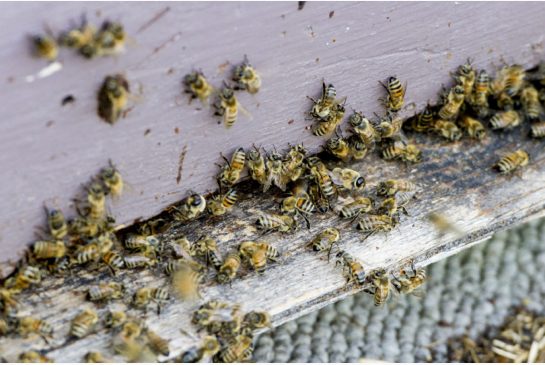Two major beekeeping firms are spearheading the launch of a $450-million class action lawsuit against two pesticide manufacturers, alleging their products have caused widespread deaths in bee colonies.
A statement of claim filed Wednesday by Sun Parlour Honey and Munro Honey asks Ontario’s Superior Court of Justice to certify a suit against Bayer Inc., its CropScience subsidiary, Syngenta International and its Canadian arm.
At issue is a widely used class of pesticides called neonicotinoids — or “neonics” — which the Ontario Beekeepers’ Association says is a toxin affecting the nervous systems of the insects making honey and pollinating crops.
The pesticide is used to coat soybean and corn seeds and has an “enormous impact,” said Julie White of the OBA, which has been pushing the Ontario government to ban neonics.
“When things get planted the dust goes into the air, it’s systemic as well growing in to the plants and it gets into puddles . . . the bees either get killed in the field or they carry it back to the hive,” she told the Star.
Consultations are underway to determine a way to “target” the use of neonics to areas where there is “demonstrated need,” Agriculture Minister Jeff Leal said in a statement.
Bayer CropScience said from its Calgary office that the company has not been served with the suit and is “unable to answer any specific questions.”
The parent companies of Bayer and Syngenta are in Europe.
A lawyer filing the suit said there is growing evidence from the European Food Safety Authority, European Commission and others on the danger of the pesticides, which will be presented to the court in the hopes of winning a class action certification next year or in 2016 while the OBA continues lobbying efforts with the government.
The situation for the beekeepers is so dire they are employing a multi-pronged approach,” said Dimitri Lascaris of Siskinds LLP, which is proposing the case be heard in Windsor.
The European Commission, for example, has restricted the sale and use of the pesticides since 2013, with Japan, France, Germany, Italy and eastern Ontario’s Prince Edward County taking various forms of action, Lascaris states in a 30-page statement of claim.
Health Canada has also blamed chemicals in the pesticides for mass bee kills and an Ontario Agriculture Ministry field crop entomologist has said the pesticide seed treatments should be used “only when necessary” in the 10 to 20 per cent of soils susceptible to wireworm and grubs, the suit alleges.
If the lawsuit is certified, other beekeepers would be included and share in the damages.
An international panel of 50 scientists working as the Task Force on Systemic Pesticides has called for neonics to be phased out, and is calling on authorities to restrict their use saying they also harm worms and birds.
Neonics, which are also applied through a spray, make up roughly 40 per cent of the insecticide market, with global sales nearing $3 billion in 2011.
